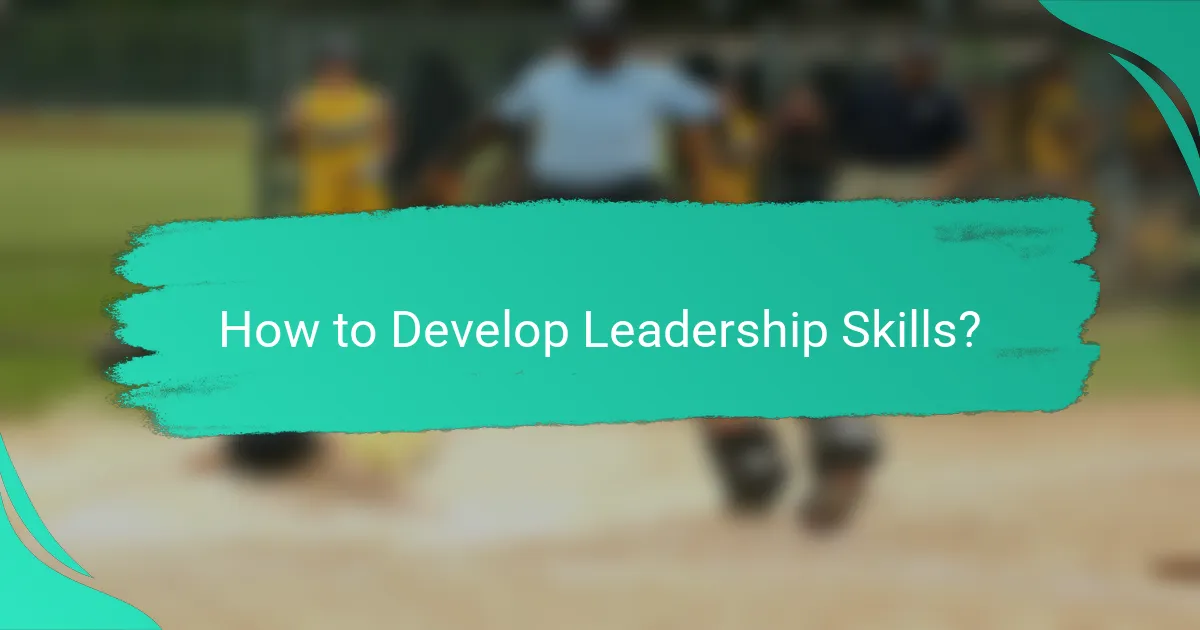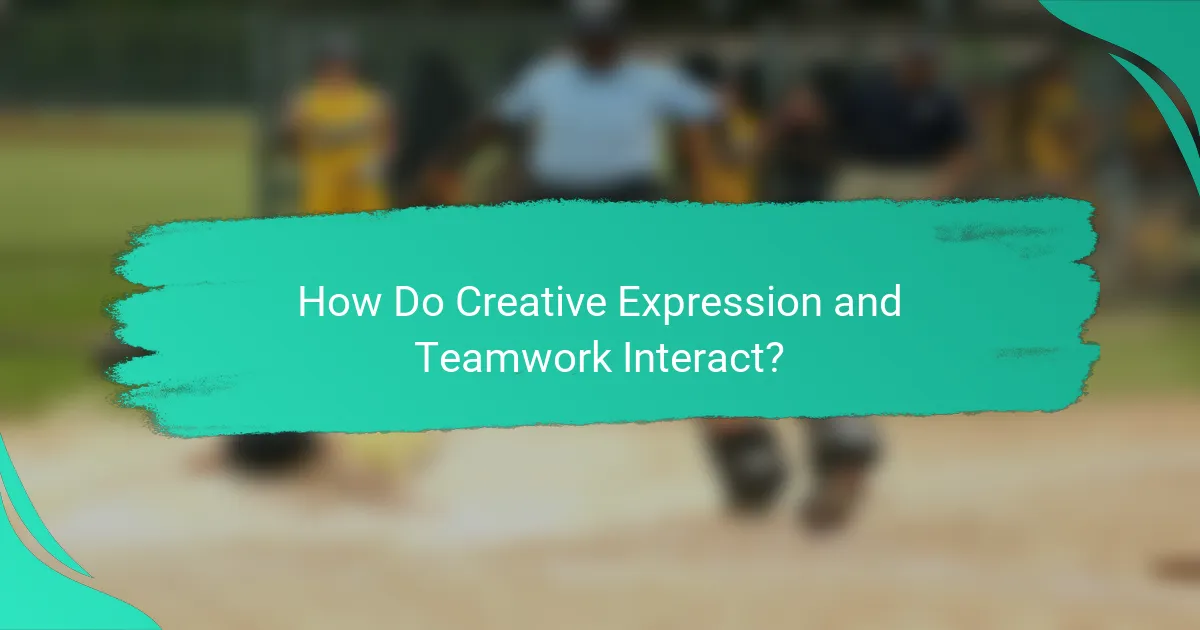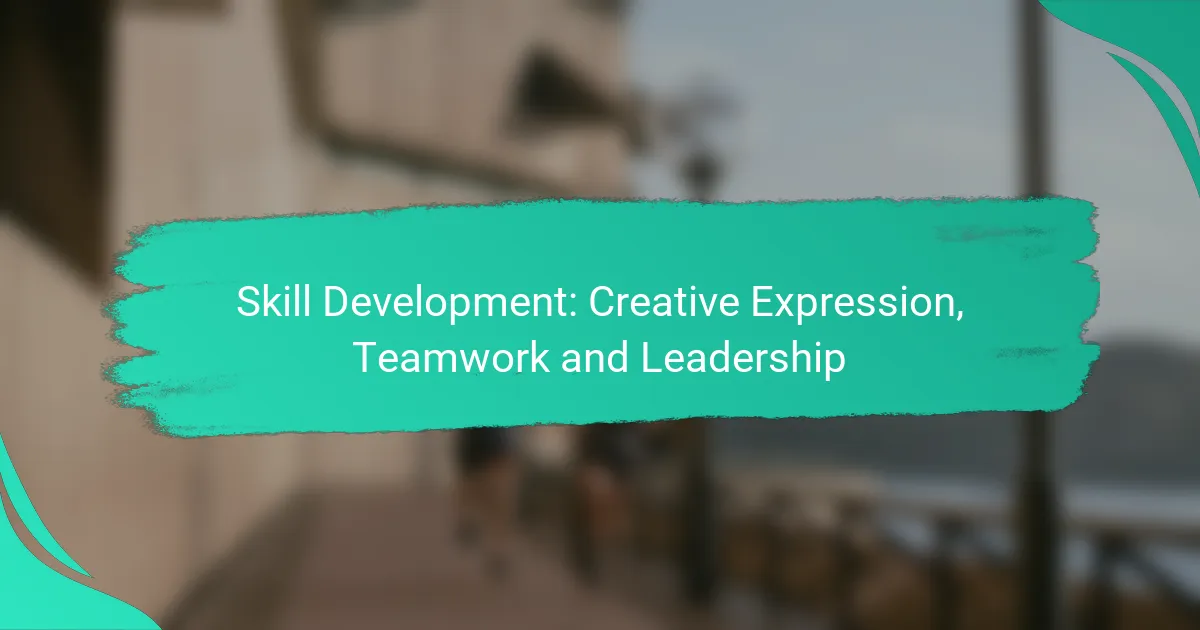Skill development in creative expression, teamwork, and leadership is essential for personal and professional growth. By fostering critical thinking and collaboration through creative activities, individuals can enhance their problem-solving abilities and communication skills. Effective teamwork strategies promote cohesion and performance, while leadership development involves education, experience, and mentorship to cultivate strong leaders.

How Can Creative Expression Enhance Skill Development?
Creative expression significantly enhances skill development by fostering critical thinking, problem-solving, and collaboration. Engaging in various forms of creativity allows individuals to explore new ideas, communicate effectively, and work well within teams.
Artistic Workshops
Artistic workshops provide hands-on experiences that encourage participants to explore their creativity through mediums such as painting, sculpture, and photography. These workshops often focus on developing technical skills while promoting self-expression and innovation.
Consider joining local community centers or art schools that offer workshops tailored to different skill levels. Look for programs that culminate in exhibitions or showcases, allowing participants to present their work and receive feedback.
Creative Writing Courses
Creative writing courses enhance storytelling abilities and improve communication skills. Participants learn to articulate their thoughts clearly and creatively, which is essential for effective teamwork and leadership.
Many community colleges and online platforms offer these courses, ranging from beginner to advanced levels. Engaging in peer reviews and workshops within these courses can help refine writing skills while fostering collaboration among participants.
Music and Performance Programs
Music and performance programs cultivate teamwork and leadership through group activities like band practice or theater productions. These programs require individuals to listen, adapt, and work together towards a common goal, enhancing interpersonal skills.
Look for local music schools or community theaters that offer ensemble or group classes. Participating in performances can also build confidence and public speaking skills, which are valuable in various professional settings.
Digital Design Training
Digital design training equips individuals with technical skills in graphic design, web development, and multimedia production. These skills are increasingly important in today’s digital economy and can enhance both individual creativity and team collaboration.
Consider enrolling in online courses or local workshops that focus on popular design software like Adobe Creative Suite. Building a portfolio through practical projects can showcase your skills to potential employers or clients, making you more competitive in the job market.

What Are Effective Teamwork Strategies?
Effective teamwork strategies involve collaborative efforts that enhance group performance and cohesion. These strategies focus on clear communication, shared goals, and mutual support among team members.
Collaborative Projects
Collaborative projects are tasks where team members work together towards a common objective. These projects can range from small group assignments to large-scale initiatives, requiring input and expertise from various individuals. To ensure success, establish clear roles and responsibilities, and set achievable milestones.
For example, a marketing team might collaborate on a campaign, with each member contributing their unique skills in design, content, and analytics. Regular check-ins can help keep the project on track and allow for adjustments as needed.
Team-Building Exercises
Team-building exercises are activities designed to improve interpersonal relations and social interactions within a team. These can include workshops, retreats, or fun activities that encourage collaboration and trust. Aim for a mix of physical and mental challenges to engage all team members.
Consider activities like escape rooms or problem-solving challenges that require teamwork to succeed. These exercises can help break down barriers and foster a sense of unity among team members.
Communication Tools
Effective communication tools are essential for facilitating teamwork, especially in remote or hybrid environments. Tools like Slack, Microsoft Teams, or Zoom allow for real-time communication and collaboration. Choose tools that fit your team’s size and workflow preferences.
Incorporate features like shared calendars and project management boards to keep everyone informed and aligned. Regular updates and feedback loops can enhance transparency and accountability within the team.
Conflict Resolution Techniques
Conflict resolution techniques are strategies used to address and resolve disagreements within a team. Approaches such as active listening, mediation, and compromise can help teams navigate conflicts constructively. Encourage an open environment where team members feel safe expressing their concerns.
For instance, using a structured approach like the “interest-based relational” method can help parties focus on mutual interests rather than positions. This can lead to solutions that satisfy everyone involved and strengthen team dynamics.

How to Develop Leadership Skills?
Developing leadership skills involves a combination of education, experience, and self-reflection. Engaging in structured programs and seeking mentorship can significantly enhance your ability to lead effectively.
Leadership Training Programs
Leadership training programs are designed to equip individuals with essential skills like communication, conflict resolution, and strategic thinking. These programs often include workshops, seminars, and online courses that focus on real-world applications.
When selecting a program, consider factors like duration, cost, and the credentials of the instructors. Many programs are available at various price points, ranging from free online courses to intensive paid workshops costing several hundred to thousands of dollars.
Mentorship Opportunities
Mentorship opportunities provide invaluable guidance from experienced leaders. A mentor can offer personalized advice, share experiences, and help you navigate challenges in your leadership journey.
To find a mentor, consider reaching out through professional networks, industry associations, or local business groups. Establish clear goals for the mentorship relationship to ensure it remains focused and productive.
Public Speaking Workshops
Public speaking workshops help develop confidence and communication skills, which are crucial for effective leadership. These workshops often include practice sessions, feedback, and techniques for engaging an audience.
Look for workshops that offer hands-on experience and constructive criticism. Many community colleges and professional organizations provide affordable options, typically ranging from a few hours to several weeks.
Decision-Making Simulations
Decision-making simulations immerse participants in realistic scenarios that require critical thinking and leadership. These simulations can range from role-playing exercises to complex case studies that mimic real-life challenges.
Participating in these simulations can sharpen your analytical skills and improve your ability to make informed decisions under pressure. Many organizations offer these experiences as part of leadership development programs, often at a moderate cost.

What Digital Products Support Skill Development?
Digital products that support skill development include a variety of online tools designed to enhance creative expression, teamwork, and leadership abilities. These products range from interactive platforms to assessment tools that provide feedback and track progress.
Online Learning Platforms
Online learning platforms offer courses and resources tailored to skill development in various fields. Popular options include platforms like Coursera, Udemy, and LinkedIn Learning, which provide access to expert-led courses on creativity, collaboration, and leadership. Users can often choose from a wide range of topics, allowing for personalized learning paths.
When selecting a platform, consider factors such as course quality, user reviews, and the availability of certificates. Many platforms offer free trials, enabling users to explore content before committing financially.
Skill Assessment Tools
Skill assessment tools help individuals evaluate their current abilities and identify areas for improvement. Tools like 16Personalities or StrengthsFinder provide insights into personal strengths and weaknesses, which can guide further development. These assessments often include questionnaires that yield actionable feedback.
Using these tools can enhance self-awareness and inform decisions about which skills to focus on. It’s beneficial to revisit assessments periodically to track progress and adjust learning goals accordingly.
Interactive E-Learning Modules
Interactive e-learning modules engage users through multimedia content, quizzes, and simulations, making learning more dynamic. These modules can be found on platforms like Khan Academy or Skillshare, where users can practice skills in a hands-on manner. The interactive nature helps reinforce concepts and encourages active participation.
When implementing e-learning modules, ensure they align with specific skill development goals. Look for modules that offer immediate feedback and opportunities for collaboration, as these features can significantly enhance the learning experience.

What Criteria Should You Consider When Choosing Skill Development Tools?
When selecting skill development tools, prioritize factors such as content quality, user experience, and cost-effectiveness. These criteria ensure that the tools you choose will effectively enhance creative expression, teamwork, and leadership skills.
Content Quality
Content quality is crucial as it directly impacts the effectiveness of skill development. Look for tools that offer well-researched, engaging, and relevant material tailored to your specific learning objectives.
Consider platforms that provide a mix of multimedia resources, such as videos, articles, and interactive exercises. This variety can cater to different learning styles and keep users engaged.
User Experience
User experience plays a significant role in how effectively individuals can engage with skill development tools. A user-friendly interface, intuitive navigation, and responsive design can enhance learning and retention.
Evaluate tools based on their accessibility across devices, such as smartphones and tablets, as well as their support for different operating systems. A seamless experience encourages consistent use and maximizes skill acquisition.
Cost-Effectiveness
Cost-effectiveness is essential when choosing skill development tools, especially for organizations with budget constraints. Assess whether the benefits of a tool justify its price, considering both upfront costs and potential long-term gains.
Look for options that offer flexible pricing models, such as subscriptions or one-time purchases, and consider free trials to evaluate effectiveness before committing. Comparing multiple tools can help identify the best value for your investment.

How Do Creative Expression and Teamwork Interact?
Creative expression and teamwork enhance each other by fostering an environment where diverse ideas can flourish. When individuals collaborate, they combine their unique perspectives, leading to innovative solutions and a stronger sense of community.
Benefits of Creative Expression in Team Settings
Creative expression in team environments encourages open communication and trust among members. When team members share their ideas freely, it cultivates a culture of respect and collaboration, which can significantly enhance overall productivity.
Additionally, engaging in creative activities together can help break down barriers and reduce tension. For example, brainstorming sessions or collaborative art projects can serve as icebreakers, allowing team members to connect on a personal level.
Strategies for Encouraging Teamwork Through Creativity
To promote teamwork through creative expression, teams should implement regular brainstorming sessions where all ideas are welcomed. Techniques like mind mapping or using creative prompts can stimulate innovative thinking and encourage participation from everyone.
Another effective strategy is to incorporate team-building activities that focus on creative tasks, such as group workshops or design challenges. These activities not only enhance creativity but also strengthen team bonds by fostering collaboration and shared goals.
Challenges and Solutions in Merging Creativity and Teamwork
One challenge in merging creativity with teamwork is managing differing opinions and creative styles. Conflicts may arise when team members have varying approaches to problem-solving. To address this, establishing clear guidelines for discussions and encouraging constructive feedback can help maintain a positive atmosphere.
Another potential issue is the risk of groupthink, where the desire for harmony leads to a lack of diverse ideas. To counteract this, teams should actively seek out and value dissenting opinions, ensuring that all voices are heard and considered in the creative process.
